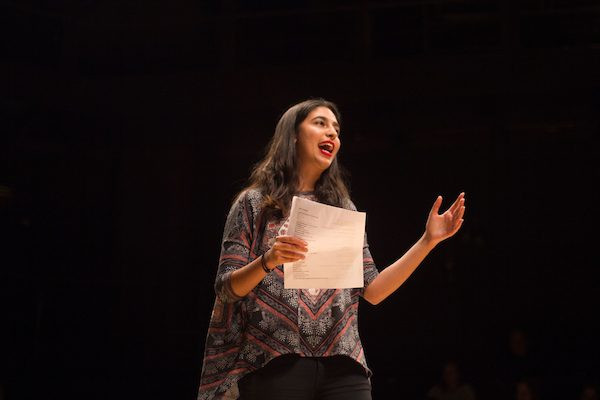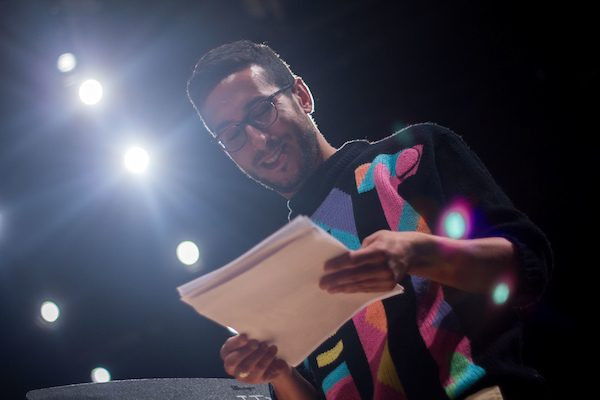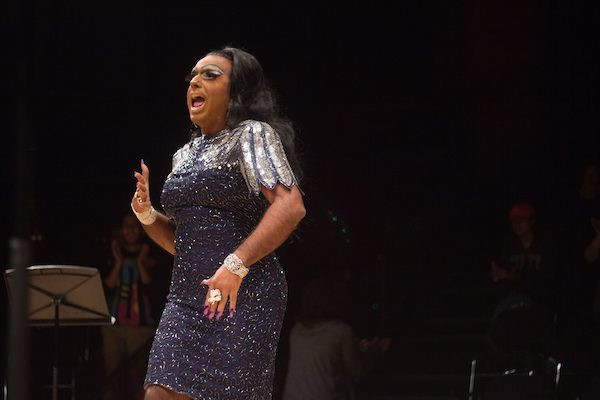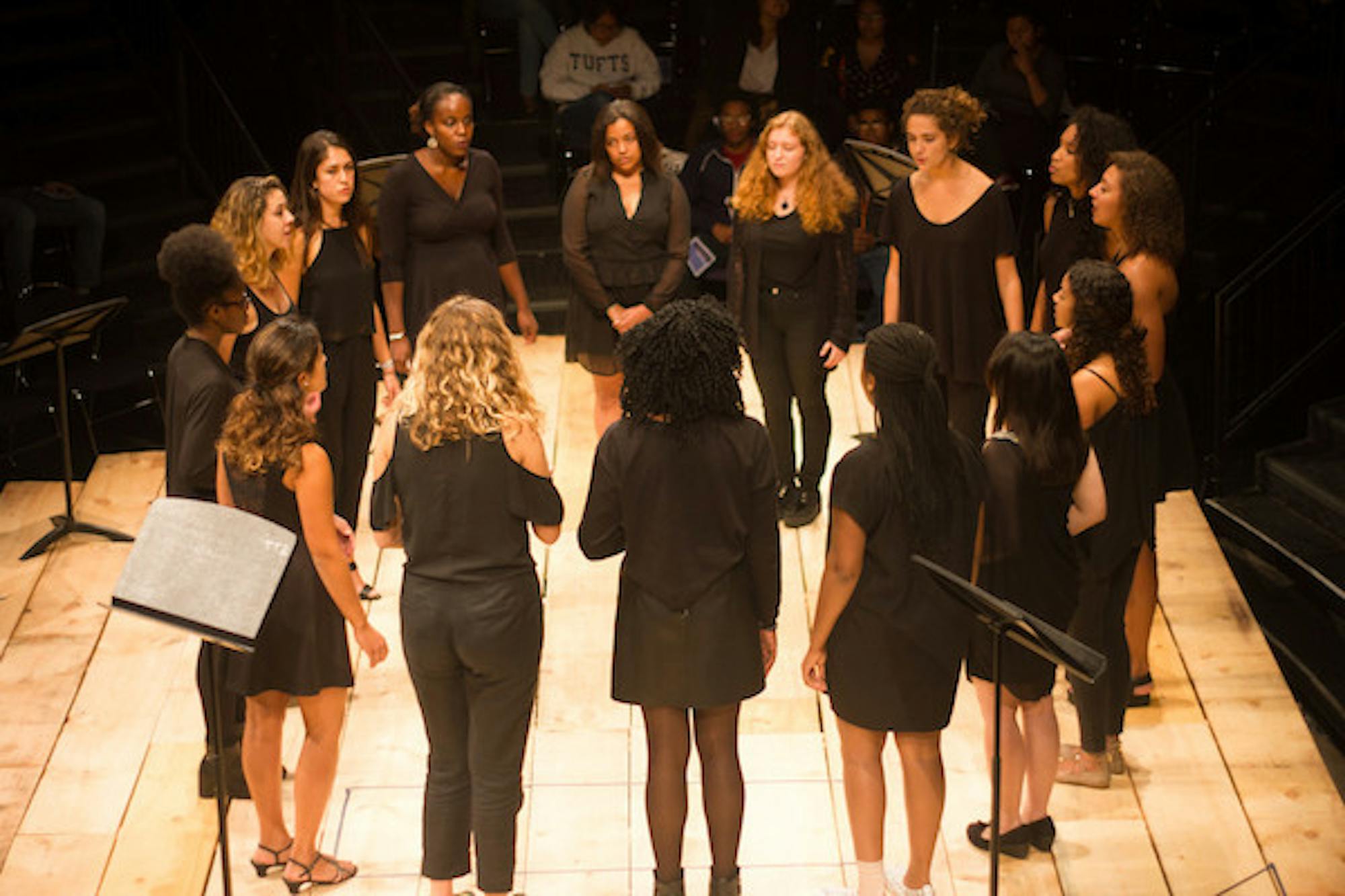Balch Arena Theatre is stripped down. A raised wooden platform, bare except for a few stray strips of masking tape, is used as a stage in the middle of the round theater. Four music stands face inward. There are no props, no scenery, and no flashy costumes. Actors come out in street clothes, position themselves at the music stands and read from scripts. There are minimal stage directions. The actors' voices are the centerpiece of "After Orlando," a performance staged in conjunction with Missing Bolts Production and No Passport Theatre Alliance, and the words they speak are all that is necessary to emotionally capture the audience.
On Sept. 30, students, professors, faculty members and alumni gathered to perform and watch 14 short pieces and original works based on the June 12 shooting at the Pulse nightclub in Orlando. Many of the victims were part of the LGBTQ and Latinx communities. "After Orlando" was co-sponsored and supported by groups across campus, including the Department of Drama and Dance, Latino Center, LGBT Center, Latino Studies, Department of Community Health, Asian American Center, Africana Center, Women's Center and University Chaplaincy.
Drama and Dance Professor Noe Montez, who directed the short plays, stressed the importance of giving the community an opportunity to come together to grieve in the wake of the shooting. Because the shooting occurred over summer break, when many members of the Tufts community were at home, some students were not given an adequate opportunity to mourn the tragedy.
“There are students who leave their institutions for the summer who don’t necessarily have communities back home that they can go to,” Montez said. “[There was a] need for some sort of community event that could bring people together to reflect upon the nightclub shooting and reaffirm the power of communities, particularly for queer people and Latinx people on campus.”
According to student performer David Ferrándiz, race was a central theme of the event.
“This is first and foremost a Latinx issue,” Ferrándiz, a senior, said. “We especially need to be understanding of the selective violence [of Orlando].”
The event opened with a performance of Sweet Honey in the Rock's song “The Women Gather” (2003) by Essence, an all-female a cappella group that specializes in music of the African diaspora.After the song, members of Essence took turns reading the 49 names of those killed at Pulse.
“If we’re doing this work to honor and remember and regard the beauty of those people’s lives, invoking their names is really important,” Drama and Dance Professor Kareem Khubchandani, who curated the show, said.
Khubchandani noted that a simple list of names can make a compelling statement.
“Having to listen to the number of Spanish last names, the racialization of it becomes so evident,” he said.
The 14 performances in the event were divided into three phases, beginning with Remembrance and Reflection.The second phase, Critique and Alliance, dealt with the larger societal issues surrounding the shooting. The final phase dealt with the subjects of Community, Empowerment and Healing.
Ferrándiz played Carlos in “Claim,” a short piece written by Ken Urban, during the first phase of the event. In “Claim,” Carlos speaks on the phone to his mother about the shooting at Pulse and asks her if she would have claimed his body if he had been one of the victims. The repetition of the question, “Would you claim my body?” throughout the dialogue is chillingly powerful. The implicit meaning behind this question, Ferrándiz explained, is, “Would you love me for who I am and for who I want to be?”
According to Ferrándiz, there is a reason why feelings about the shooting are still so strong four months after the event.
“We’re not just talking about some abstract shooting in Orlando. There are traces of that shooting in every physical space we are around,” he said. “These cultures of cis-hetero-patriarchy dominate a lot. I think that when we create space through theater, we recognize that and we recognize the need to create space.”
The second phase of the event featured a performance of “The Gun Collector” by Nathan Alan Davis, in which the actors voiced a desire to snatch up all the guns in the world and end unnecessary violence.
The final piece in "After Orlando" was a dramatized reading of Justin Torres’ June 13 article in the Washington Post article, “In Praise of Latin Night at the Queer Club,” which explores the nightclub as a space for LGBTQ and Latinx peoples to escape the violence and discrimination they face in their daily lives.
“Outside, the world can be murderous to you and your kind. Lord knows. But inside, it is loud and sexy and on,” Torres wrote.
Assistant Professor of Music Stephan Pennington and LGBT Center Director Nino Testa took turns reading lines from the article. Although the piece deals with heavy subject matter, the actors managed to coax belly laughs from audience members with lines like, “If you’re lucky, no one is wearing much clothing.”
According to Montez, the event's conclusion was meant to reaffirm the power of the community and the love everyone has to give to one another. Theater, he explained, is a particularly helpful space for healing together in the aftermath of tragedy.
“Performance is powerful [because] it brings communities together to share in a moment and to see that there are other people who want to make the areas that they live in better,” he said.
Khubchandani pointed out that healing can be a difficult process in a society where minorities frequently face violence.
“The question of healing in itself is hard because we’re constantly being damaged,” he said.
He went on to explain, however, that art is a useful space for escaping the oppression of society.
“Art has the ability to let us live outside of the dominant structures that police our feelings and our ability to articulate ourselves,” he said.
At the end of the reading of “In Praise of Latin Night at the Queer Club,” a drag performer in a sparkling dress and glittery heels mounted the stage and lip-synced the Spanish version of Gloria Gaynor’s “I Will Survive” (1978). Audience members rose from their seats, clapping along to the music, and followed the performer into the lobby of Aidekman Arts Center, which was decorated to resemble a nightclub. Glowsticks were passed around and balloons were playfully tossed through the air. As strobe lights flashed and reggaetón beats boomed, performers and audience members danced together.
At that point, a large circle of audience members and performers formed on the dance floor. Individuals took turns dancing and strutting through the middle as onlookers cheered them on. According to Montez, it was a manifestation of the themes of love, support and community that "After Orlando" embodied so well.
“[It’s] a sort of reclamation of the dance floor as a space for transformation, for community, for giving yourself the chance to express who you really are,” Montez said, describing the artistic intent behind ending such a serious performance with a dance party.
Khubchandani echoed Montez's sentiments regarding the event's conclusion.
“Grieving and mourning isn’t just about sadness, but also about celebration,” he said.
Tufts community remembers, mourns Orlando shooting in 'After Orlando'

Members of the a cappella group Essence perform in the After Orlando show at Balch Arena Theater.





